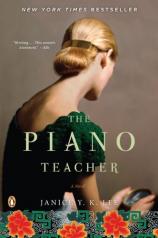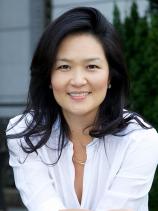Interview: December 18, 2009
December 18, 2009
In this interview with Bookreporter.com's Norah Piehl, Janice Y. K. Lee discusses the slow evolution of her debut novel, THE PIANO TEACHER, from its origins as a short story and explains some of the challenges she faced in creating characters with backgrounds differing greatly from her own. She also describes the research she performed to accurately capture life in post-World War II Hong Kong, reflects on the struggles of balancing her writing career with her home life as a mother of four, and shares some of her favorite contemporary novelists.
Bookreporter.com: What was the starting point for your debut novel, THE PIANO TEACHER? Did you get the idea for the characters and their relationships first? The plot? The setting? How did you develop these ideas in preparation for writing the novel?
Janice Y. K. Lee: THE PIANO TEACHER started as a short story about Claire and Locket, although I didn't know their names at the time. I had an idea for a story about an English woman in Hong Kong, uncomfortable, unknowing, taking a job as the piano teacher to a privileged young Chinese girl in the 1970s, the time I had grown up in Hong Kong. The tensions inherent in that relationship interested me. So, it was really a short story first, and then I expanded upon it, with Trudy and Will and also moved it back to the ’40s and ’50s. The plot really came as I wrote, surfacing in my consciousness as things people said, or places I thought they would go. I never had a map, which proved difficult, but that is the way I seem to write. The characters lead me to their story.
BRC: Claire, Will and Trudy are the main characters, and the novel is written, at different points, from all their points of view. Which character was easiest for you to write? Were any of them particularly challenging to capture their voice or point of view?
JYKL: Trudy was definitely the easiest for me to write. I knew her from the moment I conceived of her. Claire and Will were not easy for me to take ownership of. I kept thinking, what would they do, who were their parents, what were their jobs, what were their childhoods like? I knew all that about Trudy immediately. I think it's because she grew up in Asia, like me, and Will and Claire are English, and I have never spent time in England save for the occasional vacation. So, it was hard for me to place them in the world. But by the end, I knew who they were, but they were a lot harder than Trudy. She was a gift to me, a gift of the fully-formed character.
BRC: The narrative moves increasingly freely among the three main characters in this unusual love triangle and forward and backward in time. How did you go about constructing this narrative structure? Did you have a map or outline to guide you?
JYKL: I did not have a map so it took me a very long time to get it right. Part 1 took me most of a year. I kept experimenting, putting it all in the ’40s, or all in the ’50s, or all in present tense, or past, etc. etc. Then I would wait a few days, and read it. They always felt wrong. When I came upon what is the present form, it finally felt right. People have asked why I put the ’40s in the present tense and the ’50s in the past. I didn't know at the time --- it was very much a feel thing, but I think my intention was to make the ’40s seem dreamlike and immediate, which the present tense communicates, and the ’50s story was more of a conventional narrative, which unfolds as we read.
BRC: Your book contains so many fascinating, concrete details about life in Hong Kong during and after World War II. What kinds of research did you conduct to bring this world to life?
JYKL: I read a lot of memoirs by British and American people who were in Hong Kong at the time and who had been interned. This gave me a sense of the social life back then, and how people spent their days. I also read microfiche of newspapers to get an idea of what was going on in the broader world --- Queen Elizabeth ascending the throne, tensions in Korea, and I wanted to put those details in because people in that day would be interested in these public affairs. The ads in the paper were also interesting and gave me a lot of insight into daily life. You could buy a car in England and ship it to Hong Kong, people were running classified ads advertising themselves as English tutors or teachers in flower arranging. What I loved were details of food, what dishes people were eating, how much things cost --- like ferry tickets, or to have a dress made --- and the kinds of games people played, how they amused themselves back then.
BRC: You grew up in British Hong Kong, went to school in America and lived here for a while after college, and then returned to Hong Kong in 2005, after it had been returned to China. What changes did you see upon your return? What do you enjoy about living in Hong Kong?
JYKL: Hong Kong has never been England or China, but a blend all its own. So while I saw a lot of surface differences when I moved back (the currency no longer showed the Queen, but the bauhinia, the national flower; the mail was no longer called the "royal mail"), I must say a lot of life remains the same. Hong Kong is not China, but a part of China with its own unique history. I like living in Hong Kong because my parents and older brother live here and it's been great to have family close as my husband and I have four kids. The winters are also a lot more enjoyable as it never gets too cold.
BRC: The descriptions of Japanese occupation and the internment of non-Chinese nationals in Hong Kong near the end of World War II have been shocking to many American readers, who might have only a cursory grasp on this era of Asian history. Have you received any reactions to the book by Japanese readers or press? Has it been translated into Japanese?
JYKL: It has been translated into complex and simplified Chinese (meaning Taiwan/Hong Kong and mainland China) but has not been picked up in Japan, so I have not heard any reactions to the book from the Japanese public. A Japanese-American woman came up to me after a reading and said how glad she was that I wrote it, though.
BRC: Are there any elements of your novel (beyond the primary plot and characters, obviously) that had their genesis more in your imagination than in historical reality?
JYKL: Many people think the Crown Collection is real, but I made it up entirely!
BRC: THE PIANO TEACHER is now out in paperback. How have you found the experience of having your first novel published? What surprised you most about the whole process?
JYKL: What do you say when your dream comes true? It's been a crazy ride. I will say, though, that although this is my first novel, it is certainly not my first attempt at writing. I have spent 30 years working towards and dreaming of this time! I have wanted to be a writer since I was a little girl. Now that I'm on the other side, it's lovely but I don't think I'm ever going to forget all those years of writing, working and uncertainty.
BRC: With the publication of the paperback edition, book groups will now undoubtedly be drawn to discussing your book. Have you ever been involved in a book discussion group? Do you have any plans to visit or talk with groups discussing your book?
JYKL: I've done a few book clubs of friends, or friends of friends. Because I'm in Hong Kong, sometimes I've skyped. I've skyped with Singapore, Shanghai and San Francisco! I prefer a larger group because the energy is better.
BRC: In the bio on your website, you mention that you and your husband were starting a family at the same time you were writing THE PIANO TEACHER. How did you maintain focus on your novel while also tackling motherhood? How do you currently balance your four children with your writing career? What kind of writing routine do you maintain?
JYKL: It's very hard. You always feel like someone or something is getting short shrift. I try to write in the morning, but on the rare occasions I'm really writing, I tend to work all day if I can, but that's so rare that it is not a factor in my daily schedule. I think my writing suffers from inattention more than my children. Hopefully I will get more time as they get older.
BRC: Which other contemporary novelists do you read and enjoy?
JYKL: So many! Just finished books by Dan Chaon and Peter Cameron. I love Amy Hempel, Amy Bloom, Elizabeth McCracken, Michael Cunningham, Jeffrey Eugenides. The list goes on and on...
BRC: Do you plan to use Hong Kong as the setting for future novels?
JYKL: I'm not sure. I'm working on something now but it's pretty amorphous. I also don't like to say because I feel it dissipates with the saying of it.
BRC: What are you working on now?
JYKL: Ditto...
• Click here now to buy this book from Amazon.
© Copyright 1996-2011, Bookreporter.com. All rights reserved.




